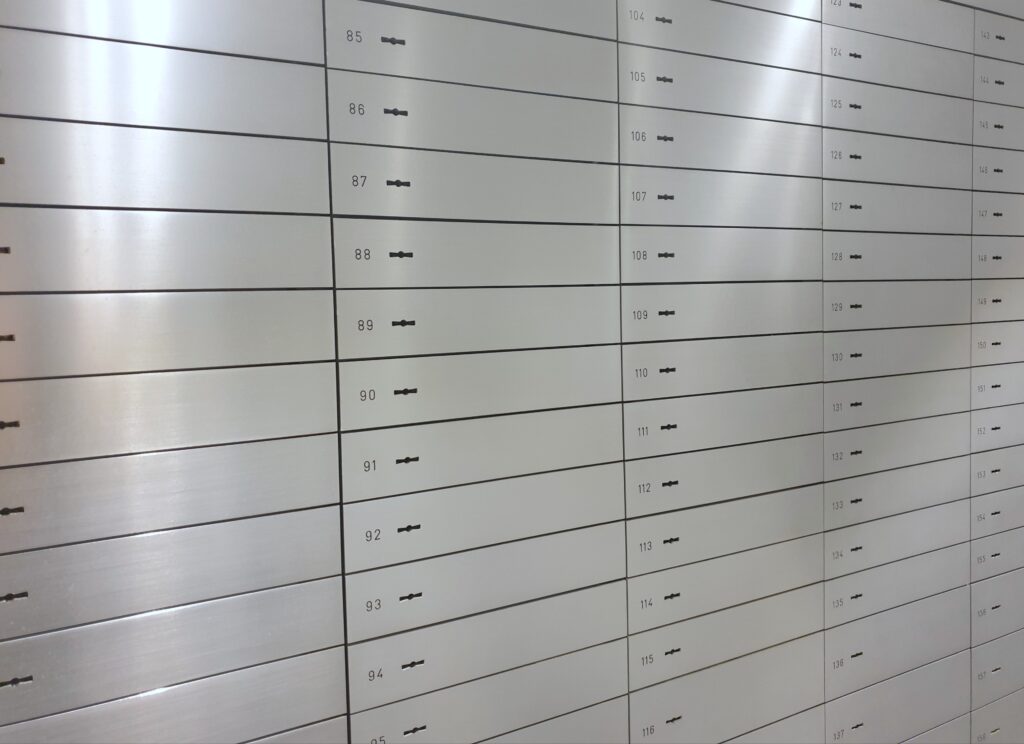A precious metal storage solution for foundations and trusts
Additional information > Services, clients and facilities > Products and services for trusts and foundations
Trusts and foundations have one thing in common: they manage assets for beneficiaries. Various assets are held in trust, often resulting from gifts or inheritances. Such benefits frequently include precious metals, especially valuable gold bequests that demand appropriate safekeeping. Independent, specialist storage companies in Switzerland and the Principality of Liechtenstein are an ideal choice for this purpose.
Safe deposit boxes and segregated storage solutions offer trustees many advantages. In addition to storage in independent, safe-haven countries, they also benefit from services specially tailored to their needs. Security, discretion, bank-independence, and custom service options are particularly important, while appropriate experience in the handling and security of assets such as gold bars or coins is likewise a vital consideration. Furthermore, the availability of comprehensive insurance cover is another decisive feature. When combined, these individual factors create optimal conditions for trustees to maximise the protection and preservation of assets on behalf of their beneficiaries.

© fotomek - stock.adobe.com
The difference between a trust and a foundation
At first glance, foundations and trusts may be perceived to perform similar tasks. A trust is a contractual relationship in which the trustee manages certain assets supplied by the settlor – the person who puts assets into the trust. The trustee acts primarily in his/her own name on behalf of the trust, but actually has no assigned legal personality and is therefore not a legal entity. Acting within the scope of his/her designated powers and duties, a trustee uses the trust assets on behalf of one or more beneficiaries.
A foundation, on the other hand, is an organization set up to pursue a specific purpose. The foundation uses the assets of a donor in order to fulfil this objective. A foundation can have individual beneficiaries, but this is not essential. In English-speaking countries, a foundation is the most common term used to describe this entity.
Key information and forms of trust
Trusts originated in the USA, but are now commonly used worldwide, including in Switzerland and Liechtenstein. One example is the well-known Liechtenstein Trust. A distinction is usually made between two different types:
A “testamentory trust” is chosen if the assets are to be protected by trustee administration only after the death of the testator. This form of trust is employed, for example, when the heirs are still minor children.
A “living trust” (or “inter vivos trust”) is far more common. This is set up during the lifetime of the trustor, and the assets earmarked for the trust fund are managed separately from the rest of the capital. The income often benefits the settlor himself until his death. Only then are the assets distributed to the appropriate heirs or beneficiaries in accordance with the asset manager’s instructions. Importantly, this arrangement helps to avoid the so-called probate procedure – a somewhat complicated inheritance process.
Reasons for setting up a trust – and thus creating a need for asset protection – include long-term care for the family, arrangements for the continuation of a business, or the consolidation of assets. According to media reports, an estimated $36 trillion is now protected in trusts worldwide. These assets are distributed among American companies, old family dynasties, large landowners in the Caribbean, or trusts originally created by British colonial rulers. However, the trust concept can be applied to almost any source of wealth, and to almost any asset value.
Key information and forms of foundation
Foundations are primarily set up for a specific purpose. Nevertheless, a general distinction can be made between charitable foundations, family foundations, and corporate foundations. There are large foundations in Switzerland targeting the development of children and young people, science, nature and the environment. According to the Swiss Foundation Report, a total of 13,524 charitable foundations were registered in 2021. Of these, 365 new companies were registered over the course of the year, with a particular focus on the cantons of Zurich, Geneva and Zug. This report publishes the outcomes of a study by the Center for Philanthropy Studies (CEPS) at the University of Basel. According to the data, there are an average of 15.5 foundations for every 10,000 inhabitants. From a global perspective, this very much positions Switzerland as a front runner.
Liechtenstein also occupies an important position globally, and foundations have been used for asset management in the principality since the 1930s. According to Liechtenstein’s commercial register, around 9,975 charitable foundations were registered here in 2020. Liechtenstein foundations are required by law to publish the purpose of the foundation. However, the situation is different for private or family foundations, which do not have to be registered. In 2021, the Liechtenstein foundation supervisory authority estimated the number of such “non-registered foundations” to be around 8,200. The principality reports the total number of existing foundations as 24,328.
The “Liechtenstein Anstalt” is a special type of foundation. This form of private law is only used in the Principality. It is not comparable to other legal forms of public-law institutions and is treated as a legal entity. The establishment’s assets are therefore exclusively liable for its liabilities. This establishment under private law includes members, partners or shareholders. Their purpose can be either economic or non-economic in nature. For example, a private institution can trade in goods, acquire shares, or manage the assets of beneficiaries.
Another special Liechtenstein form concerns “private asset structures” (PAS – but PVS in German). These are business institutions that do not carry out any economic activity in the state. Optional PVS status is used exclusively in connection with tax law and tax privileges in Liechtenstein.

© Dmitry- stock.adobe.com
Gold storage: Benefits for trusts and foundations
There are many advantages for trusts and foundations when storing gold or other precious metals with Swiss Gold Safe, a privately-owned company. Depending on the requirements and volume of product to be stored, the storage options include safe deposit boxes in Liechtenstein, safe deposit boxes in Switzerland or segregated individual custody. These are all fully insured storage solutions where the sum insured replaces the entire loss in the event of a claim.
Assets are stored independent of the banking system and require no reporting to government agencies. Goods are housed in modern high-security facilities, far away from any urban centre or sprawling metropolis. Access is restricted to clients or persons duly authorised to act on their behalf.
Benefits of storage in your own jurisdiction
For foundations from Liechtenstein or Switzerland in particular, storing assets in your own country can prove advantageous, which is why some foundation rules may stipulate this. This may result in tax advantages or be determined by instructions demanding asset protection within the same legal jurisdiction. So if the statutes of a Liechtenstein foundation contain protection against bankruptcy and seizure, direct liability can thus be avoided by securing those assets in one’s own country.
Minimising the risk of financial loss
When private individuals wish to store gold or other valuables, a single person is usually authorized to sign. However, with a foundation or trust, it makes sense to expand the group of signatories. Designating several people with signing authority means a trust or foundation avoids the risk of the sole right of disposal resting with just one trustee. This arrangement increases confidence in the institution while also reducing the potential risk to the managed assets.
Advantages for Liechtenstein Foundations with PAS status
Assets for Liechtenstein foundations with PAS (Private Asset Structure) status that do not pursue any commercial interests can also be secured via Swiss Gold Safe. This applies equally to transparent foundations (also known as dependent foundations), where the assets continue to be attributed to the fund provider, and to non-transparent foundations (independent foundations), where the capital is treated as separate from the funder.
Why should trusts/foundations store gold in CH or FL?
Switzerland and the Principality of Liechtenstein are generally regarded as “safe havens” for the storage of gold, white precious metals and other capital assets. Due to the geography of their natural landscapes, both countries offer a high level of security and optimal asset protection. Furthermore, they each have a reputation for political stability and possess an excellent financial infrastructure. They are also considered established leaders in the processing of precious metals. Another important reason why Switzerland and Liechtenstein are ideal locations for gold storage lies in their uncompromising protection of property rights, which has a long tradition.
These countries also operate their own currency system and are not members of the European Union (EU), which is a further advantage. In addition, Switzerland is not part of the European Economic Area (EEA). Both the Swiss Confederation and the Principality have fully functioning modern infrastructures. They are centrally located in Europe, and can be easily reached from anywhere in the world. For trusts and foundations, these are ideal prerequisites in the context of asset protection.
Background information about Swiss Gold Safe Ltd.
Swiss Gold Safe Ltd, with its twin locations in Switzerland and Liechtenstein, has been in business since 2006. As a specialist storage company, Swiss Gold Safe has many years’ experience in securing valuables for private investors, businesses, family offices, and high net worth individuals (HNWI and UHNWI). For so many clients, the company’s ability to act entirely independent of banks and dealers has proved the decisive factor. Organisations view our products and services as a desirable strand of their own asset protection strategy.
An overview of the benefits for trusts and foundations
- A donor’s estate or trust property often consists of high-value gold assets which require appropriate storage.
- A distinction can be made between trusts acting for beneficiaries and foundations formed for a specific purpose. Both forms are used to protect assets in Switzerland and Liechtenstein.
- In the principality, the “Liechtenstein Anstalt” and optional PAS status for foundations without an economic interest are special features.
- Switzerland and Liechtenstein are ideal locations for protecting the assets of trusts and foundations, and storage in your own jurisdiction can have some useful advantages.
- Swiss Gold Safe Ltd in Switzerland and Liechtenstein has many years’ experience in specialist storage solutions. The company is held in high regard by family offices, high net worth individuals, foundations and trusts alike.









